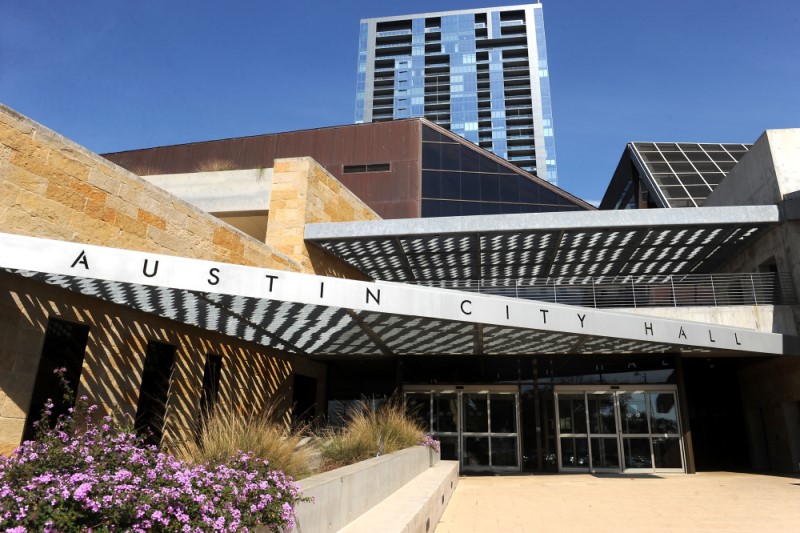Council Recap: A Quick Start, But No Victory Lap, on Reworking Public Safety
Council unites behind prompt reforms, big APD budget cuts
By Austin Sanders, 11:45AM, Fri. Jun. 12, 2020
In a series of unanimous votes Thursday, June 11, City Council took its first steps toward creating a new reality for the Austin Police Department.
Across four resolutions, Council voted to prohibit APD officers from using tear gas, set new goals and metrics for police reform, established a new Council committee to strengthen its oversight of APD, and directed City Manager Spencer Cronk to reduce APD’s funding in his upcoming Fiscal 2021 budget proposal.
The united front illustrated that Council has heard the voices of thousands of Austinites who’ve demanded real transformation of the city’s public safety apparatus. But members agreed that this was only a beginning. “I want to make sure this is no victory lap,” Mayor Pro Tem Delia Garza said. “The harder work is way ahead of us.”
The suite of resolutions proposed by Garza and Council Members Natasha Harper-Madison, Greg Casar, and Jimmy Flannigan, which the Chronicle reported on earlier this week, largely remained intact – all had been co-sponsored by the entire Council – but Thursday’s meeting did see some notable changes and amendments.
Casar changed his resolution on police tactics to prohibit entirely the use of tear gas, instead of just limiting its use against peaceful protest. The resolution also bans the use of strangleholds and chokeholds and restricts the use of “less lethal” munitions, like the lead-pellet filled bags that left protestors hospitalized, to only when a person presents an imminent threat of death or serious bodily harm to an officer, another person, or themself. Casar’s measure also prohibits officers from firing at a person fleeing, either on foot or in a vehicle.
All of these items are defined in Casar’s resolution as “the stated policy of the city…”, reflecting Council’s limited ability to compel changes to APD’s General Orders. Instead, this and the other resolutions all require public safety leaders to report back to Council on the progress made to implement the reforms. Police Chief Brian Manley’s failures in this regard have caused great frustration during his two years at the helm, as a “whereas” clause in Harper-Madison’s resolution makes clear: “[T]he elected members of City Council have no confidence that current [APD] leadership intends to implement the policy and culture changes required to end the disproportionate impact of police violence on Black Americans” and other minority groups.
Calls from CMs and the public for Manley to resign have not abated. Pending changes at the top of APD, Flannigan’s resolution creates another venue for its leaders to be held accountable. The Council Judicial Committee, charged to oversee the Municipal Court (which reports directly to Council, not to Cronk), will become a Public Safety Committee with a broader mandate and scope to consider policies and track progress on reforms. (It will also extend its purview to other public safety services, including fire and EMS.) Flannigan, who chairs both the old and new committees, said it will meet next week – asking Cronk and Manley both to make time to attend. (As of press time, the meeting date and time had not been posted.)
Garza’s resolution targets the ongoing and worsening racial and ethnic disparities seen in APD’s policing – traffic stops, citations and arrests stemming from them, and police violence. Her goal is to eliminate these inequities by 2023, the endpoint of the city’s current five-year strategic plan, which the resolution amends to make this goal explicit. A February report from the Office of Police Oversight documented the growing disparities: “We now have a baseline to measure our progress” on police reform, Garza said of her resolution shortly before its passage.
That resolution also now directs OPO to create a database cataloguing officer misconduct, available to the public. It would include all non-confidential information on “misconduct, discriminatory or racist comments or behavior,” or instances in which an officer gave “false statements,” per the resolution language. (Such information is already tracked by prosecutors, since it can be used to impeach the testimony of officers and challenge the legitimacy of arrests, and under U.S. Supreme Court precedent has to be disclosed to defendants and their counsel. Details of OPO complaints, and any disciplinary actions against officers by Manley, are public, but not organized this way.)
For activists and many callers offering input at Thursday’s meeting, policy reforms, or changes to officer training that the resolutions would require, do not go far enough to reimagine how public safety is achieved – especially given the maddening failure of previous reform efforts. Instead, they urged, Council must go further to defund and deconstruct APD – starting with reducing the department’s next budget, to be adopted in August, by at least $100 million.
Longtime East Austin community leader Brenda Malik, who said her younger brother was killed by local law enforcement, told Council, “I’m so tired of hearing that our policemen followed policy. That means the policy was wrong. ... You also have to deconstruct the police force, because training isn’t working. If you redirect any money, put some teeth in the [OPO] and the Equity Office.”
Harper-Madison’s resolution directs Cronk, in the baseline budget he’ll present to Council in July, to eliminate funding for about 200 officer positions that APD has been unable to fill, and to not include new funding for impact munitions or tear gas. The manager is also charged with exploring options to transfer roles and duties currently performed by APD officers to other departments or outside partners.
The money divested from APD should instead be invested by Cronk into alternatives to emergency calls involving homelessness, family violence, or mental health crises – all of which APD’s current tools and training leave most officers ill-equipped to manage, despite their being frontline first responders. “I fully intend to take a good hard look at every single opportunity to transform our spending priorities so it reflects our community and our values,” Harper-Madison said.
Some specific guidance for Cronk includes adding non-APD members to the Homeless Outreach Street Team and expanding Austin-Travis County EMS’s Community Health Paramedic program. The resolution also directs Cronk to set aside funds to implement reforms recommended in the several audits of APD culture, training, and hiring practices that are currently underway.
Despite the public’s call for defunding, many on Council insisted that was not their goal. “This Council is not calling to abolish or defund the police,” Mayor Steve Adler said. “We are asking (Cronk) to give us a budget to show how public safety priorities can continue in a reimagined way. … Today’s action only ensures we get a pathway” to change; come budget adoption in August, “we look at tradeoffs, and that will be when decisions are really hard. But we’ll also get a chance to make history.”
Got something to say on the subject? Send a letter to the editor.
A note to readers: Bold and uncensored, The Austin Chronicle has been Austin’s independent news source for over 40 years, expressing the community’s political and environmental concerns and supporting its active cultural scene. Now more than ever, we need your support to continue supplying Austin with independent, free press. If real news is important to you, please consider making a donation of $5, $10 or whatever you can afford, to help keep our journalism on stands.
Austin Sanders, Feb. 6, 2023
Lina Fisher, Dec. 9, 2022
April 19, 2024
April 19, 2024
Austin City Council, Council Recap, Austin Police Department, Greg Casar, Delia Garza, Jimmy Flannigan, Natasha Harper-Madison, Brian Manley, Black Lives Matter protests, less lethal munitions, defund the police











